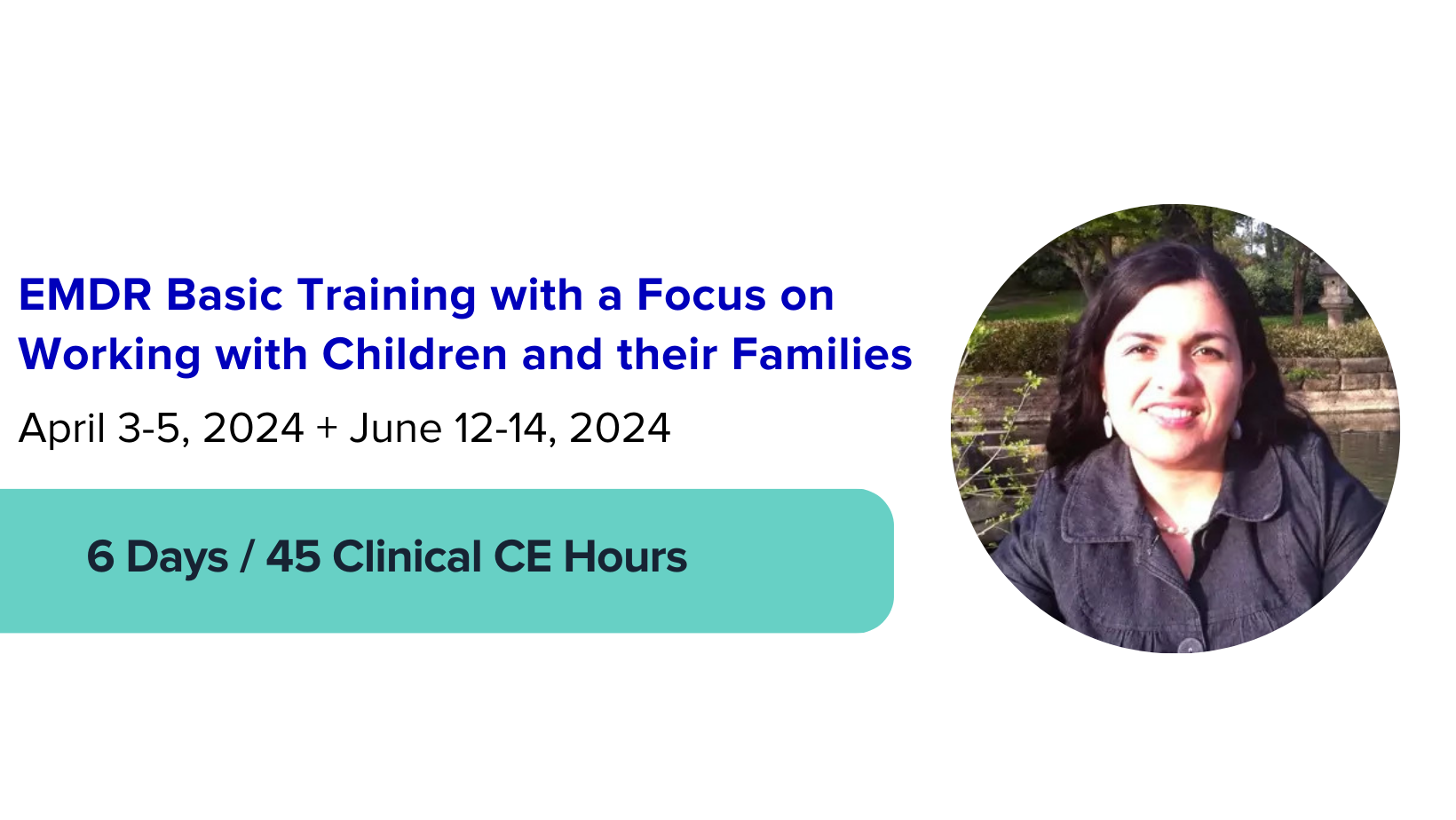EMDR Basic Training with a Focus on Working with Children and their Families

EMDR Basic Training with a Focus on Working with Children and their Families
- EMDR Basic Training Fee
- $1800
- EMDR Basic Training Fee: Non-Profit Therapists + Graduate Students
- $1400

- EMDR Basic Training Fee
- $1800
- EMDR Basic Training Fee: Non-Profit Therapists + Graduate Students
- $1400
Presented By
-
 Viviana Triana, LCSW SupervisorMore Info
Viviana Triana, LCSW SupervisorMore Info
Brought to You By
Dates and Times
-
-Live Webinar
-
-Live Webinar
-
-Live Webinar
-
-Live Webinar
-
-Live Webinar
-
-Live Webinar
Location
-
Live WebinarAccess virtually on TPN.health
45 CE Hours + 10 Consultation Hours = 55 Training Hours
This training course consists of six full days of training, including didactic and practicum components plus 10 hours of group consultations with EMDRIA-approved consultants and access to an extensive resource library, including videos of advanced training in various topics.
This training provides supplemental information for children and adolescents in both parts. It will cover how to use EMDR therapy with developmentally appropriate adaptations for children and adolescents while also including information on how to use it with adults. You will leave this training equipped with the tools you need to practice EMDR with both children and adults.
Participants will receive a Certificate of Completion of Basic Training in EMDR Therapy, which will allow for the provision of EMDR Therapy with a wide range of clients. Participants will also be eligible to attend further training in EMDR Therapy at the advanced level, participate in the EMDRIA Regional Meetings, and be eligible to pursue certification in EMDR Therapy.
- • Counselors
- • Addiction Counselors
- • Social Workers
- • Licensed Marriage and Family Therapists
The educational goal of this workshop is to increase knowledge about EMDR Therapy, with additional information about working with children and adolescents.
-
Adler-Tapia, R., & Settle, C. (2017). EMDR and the art of psychotherapy with children: Infants to adolescents treatment manual. New York, NY: Sringer Publishing company, LLC.
-
EMDR International Association. (Fall 2020). EMDR and racial trauma. Go With That, 25 (3), 1–40.
-
Grimmett, J., & Galvin, M. D. (2015). Clinician experiences with EMDR: Factors influencing continued use. Journal of EMDR Practice and Research, 9(1), 3–16. https://doi.org/10.1891/1933-3196.9.1.3
-
Lee, C.W., & Cuijpers, P. (2013). A meta-analysis of the contribution of eye movements in processing emotional memories. Journal of Behavior Therapy & Experimental Psychiatry, 44, 231-239.
-
Knipe, J. (2018). EMDR toolbox: Theory and treatment of complex PTSD and dissociation. 2nd edition, Springer Pub.
-
Moreno-Alcázar A., Treen D., Valiente-Gómez A., Sio-Eroles A., Pérez V., Amann B. L., et al. . (2017). Efficacy of eye movement desensitization and reprocessing in children and adolescents with post-traumatic stress disorder: a meta-analysis of randomized controlled trials. Front. Psychol. 8:1750. 10.3389/fpsyg.2017.01750
-
Shapiro, F. (2018). Eye Movement Desensitization and Reprocessing (EMDR) Therapy: Basic Principles, Protocols, and Procedures. Guilford Press.
-
Watts, B.V. et al. (2013) Meta-analysis of the efficacy of treatments for posttraumatic stress disorder. Journal of Clinical Psychiatry, 74, e541-550. doi: 10.4088/JCP.12r08225
-
Wheeler, K. (2022). Eye Movement Desensitization and Reprocessing Therapy, chapter 7, pp 329-359 in Psychotherapy for the Advanced Practice Psychiatric Nurse: A how-to for evidence-based practice. 3rd edition. Springer Pub.
TPN.health has been approved by NBCC as an Approved Continuing Education Provider, ACEP No. 7267. Programs that do not qualify for NBCC credit are clearly identified. TPN.health is solely responsible for all aspects of the programs.
Course meets the qualifications for hours of continuing education credit for LPCCs as required by the California Board of Behavioral Sciences. TPN.health is approved by the California Association of Marriage and Family Therapists to sponsor continuing education for LPCCs. TPN.health maintains responsibility for this program/course and its content.
Trusted Provider Network, LLC is recognized by the New York State Education Department’s State Board for Mental Health Practitioners as an approved provider of continuing education for licensed mental health counselors. #MHC-0220.
This course has been approved by TPN.health, as a NAADAC Approved Education Provider, for educational credits. NAADAC Provider #198061, TPN.health is responsible for all aspects of the programming. Counselor Skill Group: Legal, Ethical and Professional Development.
TPN.health, #1766, is approved to offer social work continuing education by the Association of Social Work Boards (ASWB) Approved Continuing Education (ACE) program. Organizations, not individual courses, are approved as ACE providers. State and provincial regulatory boards have the final authority to determine whether an individual course may be accepted for continuing education credit. TPN.health maintains responsibility for this course. ACE provider approval period: 03/31/2022 – 03/31/2025. Social workers completing this course receive 55 continuing education credits.
Course meets the qualifications for hours of continuing education credit for LCSWs as required by the California Board of Behavioral Sciences. TPN.health is approved by the California Association of Marriage and Family Therapists to sponsor continuing education for LCSWs. TPN.health maintains responsibility for this program/course and its content.
Trusted Provider Network, LLC is recognized by the New York State Education Department’s State Board for Social Work as an approved provider of continuing education for licensed social workers #SW-0654.
Course meets the qualifications for hours of continuing education credit for LCSWs as required by the California Board of Behavioral Sciences. TPN.health is approved by the California Association of Marriage and Family Therapists to sponsor continuing education for LMFTs. TPN.health maintains responsibility for this program/course and its content.
Trusted Provider Network, LLC is recognized by the New York State Education Department’s State Board for Mental Health Practitioners as an approved provider of continuing education for licensed marriage and family therapists #MFT-0097.
-
Part 1, Day 1: EMDR Basic Training with A Focus on Working with Children and their Families-Viviana Triana, LCSW SupervisorLive Webinar
-
Part 1, Day 2: EMDR Basic Training with A Focus on Working with Children and their Families-Viviana Triana, LCSW SupervisorLive Webinar
-
Part 1, Day 3: EMDR Basic Training with A Focus on Working with Children and their Families-Viviana Triana, LCSW SupervisorLive Webinar
-
Part 2, Day 1: EMDR Basic Training with A Focus on Working with Children and their Families-Viviana Triana, LCSW SupervisorLive Webinar
-
Part 2, Day 2: EMDR Basic Training with A Focus on Working with Children and their Families-Viviana Triana, LCSW SupervisorLive Webinar
-
Part 2, Day 3: EMDR Basic Training with A Focus on Working with Children and their Families-Viviana Triana, LCSW SupervisorLive Webinar

